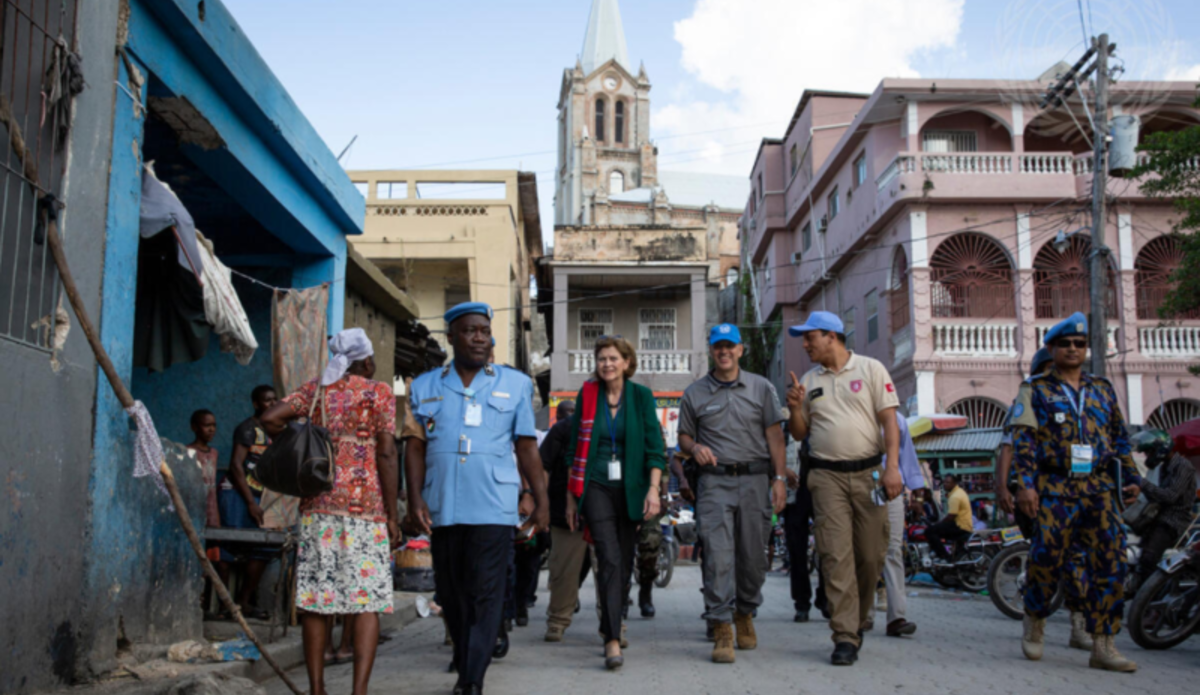Mr. Deputy Assistant Minister,
Thank you for well as for the opportunity to provide you with a briefing on the current security situation in Haiti.
Following the shocking assassination of President Jovenel Moïse on 7 July of last year, Haiti’s turbulent politics entered a new phase of uncertainty that persists to this day.
Months of discreet discussions conducted by Prime Minister Ariel Henry have led to a new government, unveiled on 24 November, on the basis of a political agreement struck on 11 September with some national political and civil society sectors.
However, efforts by the Prime Minister to broaden this consensus and bring on board other Haitian stakeholders involved in competing transitional governance initiatives are yet to bear fruit.
Most recently, we saw the merging of two such initiatives, that of the Montana Group and the Protocole d’entente nationale, which calls for a 24-month transition led by an appointed five-member presidential college.
An inclusive common way forward is needed to foster the type of political and security environments that could result in the holding of elections, and thus the restoration of democratically elected institutions.
The Prime Minister has recently reiterated his call for dialogue to help chart just such a roadmap and begin to lead Haiti out of its current governance crisis and in a way that strengthens stability. We must be prepared to provide support in a manner that helps create a climate for this to happen sooner rather than later.
Excellencies, Ladies and gentlemen,
Amid the ongoing dispute over the governance modalities best suited for the institutional vacuum, the link between gangs and politics and the instrumentalization of criminal armed groups by some politicians and business leaders continue to pose an acute threat to Haitian society.
As we speak, large swaths of the country’s population live in terror of the gangs. These criminal groups are engaged in a growing competition for control over territory and the economy, which adversely impacts the security environment and poses a direct challenge to the Haitian National Police.
The security situation has continued to deteriorate in recent months. The Port-au-Prince metropolitan area, in particular, has recently witnessed multiple random deadly shootings against public transportation vehicles, an increase in homicides, the ballooning of kidnappings for ransom, and a weeks-long blockage of fuel terminals which severely constricted the supply of petroleum products in October and November of last year.
Those charged with the primary responsibility for the security of Haitian citizens, the Haitian National Police, are hampered by a chronic lack of adequate equipment as well as a dearth of logistical and financial support. The Superior Council of the National Police, headed by the Prime Minister, continues to affirm that the police can restore security throughout the country. But the Council has also requested support from the international community.
It is essential that bilateral partners, multilateral institutions, and Haitian authorities devise an effective collaborative approach to help Haiti tackle its security problems. Such an effort must have at its center the continued development and professionalization of the national police.
Within this framework, the UN Integrated Office in Haitia and the UN country team remain steadfastly committed to advising and supporting the national police as it strives to reinforce certain essential units – such as the anti-kidnapping and the drone units – in order to better address the security challenge. United Nations efforts also include providing support in the development of the next multi-year strategic plan for the Haitian National Police
In coordination with the leadership of the HNP, the United Nations and other stakeholders have undertaken to develop a short-term, quick impact police reform plan. The implementation of the plan could be supported through the creation of a basket fund. Designed to be led by Haitian authorities but managed by the UN Development Programme, such a multi-donor fund would respond directly to priorities identified by the national police following a recent administrative and financial management audit.
Madam Minister, ladies and gentlemen,
To be sure, gang violence cannot be addressed through policing alone. A law enforcement approach needs to be complemented by socio-economic projects and reintegration activities aimed at generating employment and revenue in the neighborhoods most affected by the scourge of gang violence. The UN has supported the Haitian authorities in developing the recently adopted national community violence reduction strategy premised on such a holistic approach. The Government must now ensure that it is swiftly and effectively implemented. We must also continue in our efforts to find solutions to the disproportionate impact of gang violence on women and girls. Our continued support to the Haitian authorities is crucial to the success of this effort.
I firmly believe that today’s meeting will significantly contribute to further boosting national efforts to strengthen police capacities and promote a safer security environment, which is an essential condition for credible, transparent, and democratic elections to be held and development to take place.
The Haitian National Police needs international support if it is to fulfill its role to serve and protect the Haitian people as they deserve. It is important that we do not abandon Haiti and its security institutions at this critical stage.
Ultimately, security will depend in the long run on stronger foundations for political stability. Supporting Haitian stakeholders to overcome their divisions, act cohesively, and assume joint ownership of a single and unified national vision that will lead the country towards the restoration of democratically elected, fully functional institutions as soon as possible is our main path to sustainable security and stability in the country.
Thank you.

